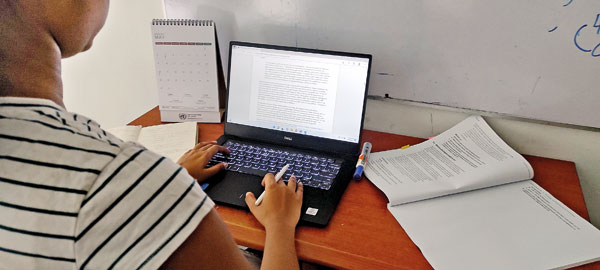News
Learning the hard way that uni dreams are vanishing
View(s):A mid rising costs of living and never-ending lines for essentials, international university students from Sri Lanka have begun to experience the blowback of the economic calamity.
Letters of rejection on the basis of the meltdown, making students more dependent on university aid, circulated on social media last week as higher education institutes were showing greater reluctance to enroll Sri Lankans for fear that they would end up requiring aid. Universities issued clarifications that applications will be dealt with on a case-by-case basis with due consideration to a student’s specific context and application. Concerns run high nonetheless.

Students who applied to universities abroad are now giving up on their plans because they couldn’t afford it anymore.
The continuing depreciation of the rupee is a deeper worry.
“I’ve been accepted, but because of the severe depreciation of the rupee, the price of my education has now almost doubled,” said one 19-year-old applicant who is hoping to study law in the UK. The money she had saved up would no longer cover the costs. She also added that she was concerned about the Central Bank’s restrictions on forex remittances. “Even if I did have the means, it is very likely that I won’t be allowed to convert such large sums of money into (UK) pounds.”
She had previously applied for scholarships for students from regions facing instability and is now appealing the decisions given how much the situation has worsened. She has till June 1, 2022, next Wednesday, to find a solution. She notes that while the university had been “kind and supportive”, administrations are also limited to the processes in place. “Interestingly, this whole thing has really highlighted how endemic calling in favours and speaking to someone who knows someone, is in Sri Lankan culture, because while the admissions team at my college is very sweet they’re only able to work within the strict system.”
Another international relations and politics student who applied to the United States and Canada noted that she had given up on her plans because she couldn’t afford it anymore. While she had received admission to a few universities she had not been approved for aid, which made it virtually impossible for her to attend. She added that some “admissions” were token enrollments given to show “inclusivity”. “I’ve already shown them that I can’t afford to pay but have received no aid at all, which means they know I won’t be able to attend even if I do get admission.”
Since studying in Sri Lanka is also expensive for those who do not gain admission into local universities, most students have begun taking gap years to try and earn.
“I got into the University of Colombo and that’s free, so I have opted to pursue my degree there.”
However, acceptance rates into local universities are low. While over 200,000 students have sat for their Advanced Levels every year since 2013, the number that gained admission into universities has never exceeded 42,000.
State universities recorded a 22.98% acceptance rate in 2019-2020. According to University Grants Commission statistics, while 181,206 students qualified, only 41,641 were accepted in 2019-2020. The qualified but rejected rate stands at 77%.
Department of Examinations statistics show that 235,550 students sat for their local A Levels in 2019.
The numbers for students exiting private high schools are unavailable. While private higher education is significantly more expensive and sometimes a luxury that most parents cannot afford, many students depend on it to later enter competitive job markets.
Under the current circumstances however, a degree is becoming a distant dream.
Sri Lankan students abroad are also facing severe forex remittance restrictions and running out of means to pay for accommodation, food, and even tuition.
“My university has given me the option of either taking the semester off till I can pay or leave altogether,” one student from Shanghai in China told the Sunday Times. While part time jobs pay for their survival, students hardly have the time to do jobs that can help support their degree.
Coming home for the holidays was also out of the question and many students were opting to use their summer vacation to work. “Hopefully I can build up a lump sum of some sort that will help me out,” one noted.
*Students quoted in the article wished to remain anonymous to avoid affecting their applications and enrollment status.
The best way to say that you found the home of your dreams is by finding it on Hitad.lk. We have listings for apartments for sale or rent in Sri Lanka, no matter what locale you're looking for! Whether you live in Colombo, Galle, Kandy, Matara, Jaffna and more - we've got them all!

